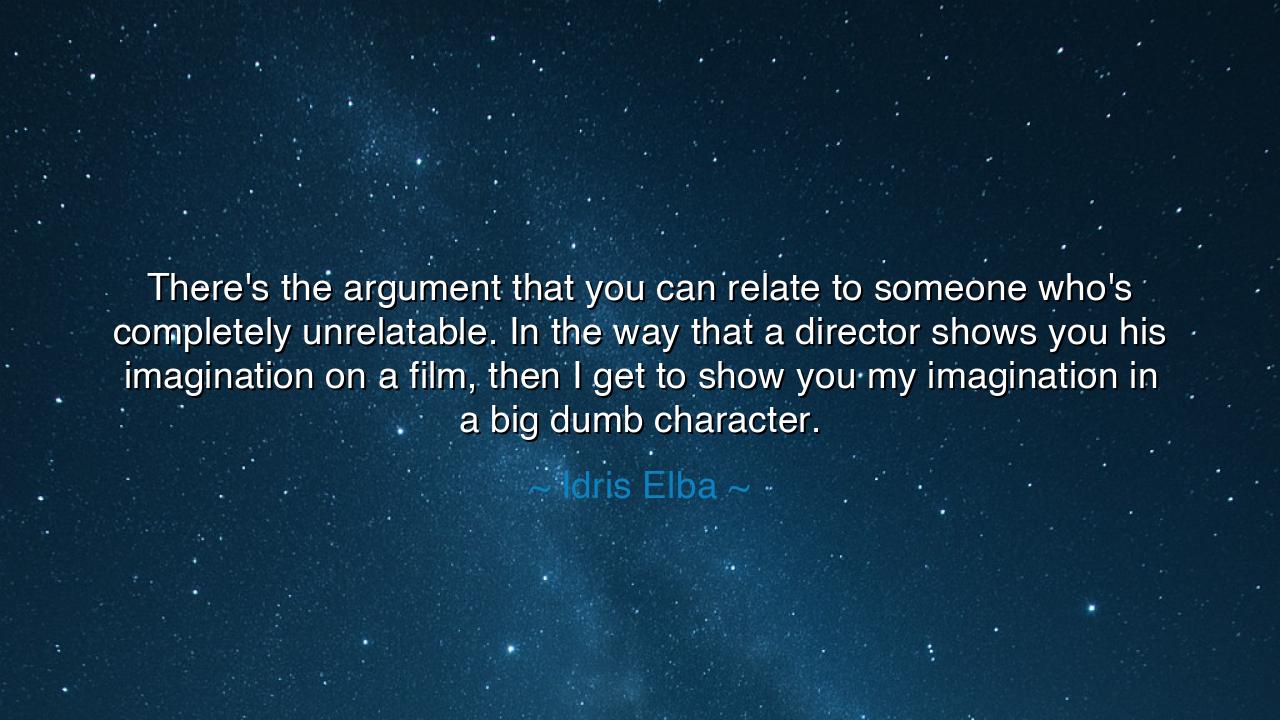
There's the argument that you can relate to someone who's
There's the argument that you can relate to someone who's completely unrelatable. In the way that a director shows you his imagination on a film, then I get to show you my imagination in a big dumb character.






O children of the earth, gather now and listen to the words of Idris Elba, for his reflections on the nature of relatability and the art of imagination offer a profound truth about the power of creativity. He said, "There's the argument that you can relate to someone who's completely unrelatable. In the way that a director shows you his imagination on a film, then I get to show you my imagination in a big dumb character." These words carry a deep understanding of the connection between the artist, their work, and the audience. Elba speaks of the way an actor can make a character—no matter how unrelatable—feel real, feel human, and stir something within us. Through the art of performance, the actor becomes the conduit for their imagination, just as the director does through the lens of the camera. It is in the act of creation that we reveal our humanity, even in the most fantastical or seemingly absurd of characters.
Imagination, O children, is the very heart of all creation. It is what allows us to step outside of ourselves and see the world through different eyes—even the eyes of those who seem unrelatable. Elba teaches us that we are all capable of relating to others, even when they seem so far removed from our own experiences. This is the magic of imagination. It enables us to connect to the unfamiliar and the unknown, to see beyond the surface and reach into the deeper layers of the human soul. An actor, like Elba, brings a character to life through their imagination, showing us something of ourselves even when the character seems utterly different from us. Through this creative process, the actor, like the director, offers us a glimpse into their own world, their own vision, while simultaneously drawing us into the universal truths that bind all humanity.
Consider, O children, the great playwright William Shakespeare, whose characters—whether kings or commoners, villains or heroes—spoke to the deepest parts of the human condition. Even the most unrelatable of his characters, such as the treacherous Iago in Othello or the tortured Macbeth, hold a mirror to our own nature. Shakespeare did not just write fictional characters; he gave us glimpses of the complexities, the flaws, and the virtues of human beings, showing us that even the most distant or unlikable individuals are tied to the very truths of the human soul. Just as Elba makes a character come alive through his imagination, so too did Shakespeare use his words to create characters who felt both strange and deeply familiar.
Elba’s words remind us that the artist’s role is not just to create something beautiful or realistic, but to offer us a piece of their soul, to make us feel something profound, even when it comes in the form of a big dumb character. The unrelatable character is not unworthy of our attention; they are worthy of our imagination. Through the artist’s craft, we are led to understand that the seemingly absurd or incomprehensible can, in fact, reveal the most human truths. The big dumb character is not dumb at all—it is a reflection of the artist’s creative spirit, offering a portal through which we can explore deeper parts of ourselves and the world.
Think, O children, of how many stories have been told through the lens of the ridiculous. The great comedians of history, like Charlie Chaplin or Robin Williams, have made us laugh while also making us reflect on the deepest aspects of human life. Chaplin, in his silent films, portrayed characters who were often comical and unrelatable at first glance—yet through his portrayal, he revealed the humanity beneath the surface. The Tramp, though a figure of mimicry and absurdity, represented the struggle, the hope, and the resilience of the common man. In this way, the unrelatable character becomes a mirror for our own struggles and dreams. Elba, too, in his roles, brings to life characters who may seem unusual or exaggerated, yet in doing so, he taps into something universal, something that we all share in the human experience.
So, O children, the lesson here is clear: imagination is the key that unlocks the door to relating to others, no matter how different they may seem. Art, whether through acting, writing, or visual expression, is a means of connection—connection to others, to the unseen world, and to the truths that live within us all. The big dumb character or the unrelatable hero is a symbol of something deeper, something more profound. Through imagination, we see beyond what is on the surface and connect to the deeper human truths that unite us all.
Therefore, O children, embrace the unrelatable and honor the imagination. When you create, whether through art, speech, or thought, know that the most absurd or distant ideas can often reveal the most profound truths. Do not shy away from the unfamiliar or the strange, for it is in these things that we find the seeds of understanding. Let your imagination soar, and in doing so, you will bridge the gaps between the self and the other, and find connection in the most unexpected places.






AAdministratorAdministrator
Welcome, honored guests. Please leave a comment, we will respond soon